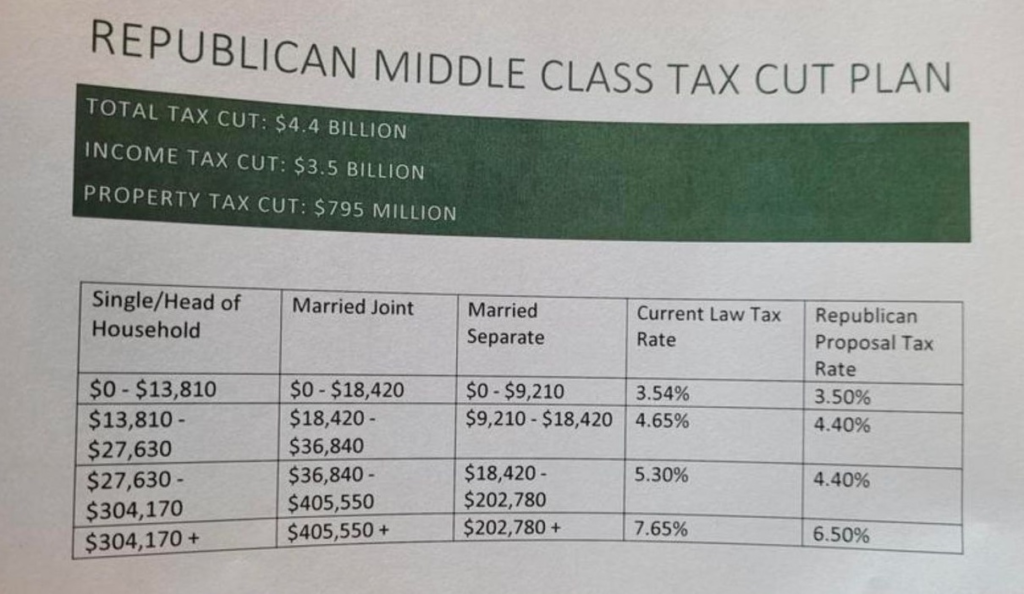Politics
Wisconsin income taxes would be cut 15% on average under GOP plan, while biggest percent drop goes to those earning over $304,000

MADISON, Wis. (AP) — Income taxes would be cut across the board by $3.5 billion under a plan announced Thursday by Republicans, who control the Wisconsin Legislature’s budget-writing committee, a proposal that Democrats assailed as being skewed to benefit the wealthy.
Under the income tax cut, which would be retroactive to Jan. 1, 2023, the average reduction would be 15% for all filers or $573, Republicans said. The state would still go from four to three brackets, with the lowest rate dropping to 3.5% and the highest rate being 6.5%.
The largest percentage point drop would be at the highest rate, paid by married couples who earn more than $405,550 or single people making more than $304,170. That rate would drop from 7.65% to 6.5%. The middle two brackets would collapse so all married couples earning between $9,210 and $202,780 would pay 4.4%. The lowest rate for the poorest taxpayers would drop only slightly, from 3.54% to 3.5%.

Democratic Gov. Tony Evers, who had proposed a tax cut primarily benefitting low and middle-income earners, criticized the GOP plan.
Evers “believes that when we deliver tax relief, it should be real, responsible and targeted to the middle class,” his spokesperson Britt Cudaback said on Twitter. “The GOP is doubling down on tax breaks for wealthy millionaires and billionaires instead of prioritizing relief for working families.”
The income tax cut will be paid for by tapping the state’s projected $7 billion surplus. Republicans were also devoting $622 million to keep property taxes in check.
Some Republicans, including Senate Majority Leader Devin LeMahieu, had wanted even deeper cuts. LeMahieu proposed moving to a flat income tax rate of 3.25% by 2026, saying the state surplus offered a “once-in-a-lifetime opportunity” to make generational tax reform. But fellow Republicans balked at that plan, which would have cost nearly $5 billion over two years.
Wisconsin’s total tax burden, which is total taxes measured as a share of personal income, fell to its lowest point in more than 50 years in 2022, according to the Wisconsin Policy Forum. It also found that in recent years, Wisconsin income tax rates have declined more for higher income earners than they have for those with lower incomes.
Overall, however, when compared to national averages, rates in Wisconsin are higher for higher incomes and lower for lower incomes.
Republican Rep. Terry Katsma said the cuts were designed to keep Wisconsin competitive with neighboring states with lower rates, like Illinois, which has a flat tax of 4.95%.
“We have to be competitive with the states around us,” Katsma said.
But Democrats objected, saying the tax plan would make the state less competitive when combined with GOP budget decisions to end funding for child care programs and cut spending for the University of Wisconsin.
“Those issues were ignored, denied, for this, what they came out with today, which was primarily a tax cut for the very wealthy,” said Democratic Rep. Tip McGuire.
“They are making Wisconsin a place that is unattractive and inhospitable to women and to families,” said Democratic Sen. Kelda Roys.
The last state budget, passed by the Republican Legislature and signed by Evers in 2021, cut income taxes by more than $1 billion.
The tax plan, as part of the larger state budget, must pass both the Senate and Assembly before it would go to Evers. He can make changes with his line-item veto power before signing the two-year spending plan into law.
The budget-writing Joint Finance Committee was scheduled to add the tax cut as one of the final pieces of the two-year state budget later Thursday. The budget will likely be passed by the state Senate and Assembly next week, sending it to Evers for his consideration. Evers can either sign the budget, veto it or make partial vetoes.
Harm Venhuizen is a corps member for the Associated Press/Report for America Statehouse News Initiative. Report for America is a nonprofit national service program that places journalists in local newsrooms to report on undercovered issues. Follow Harm on Twitter.

